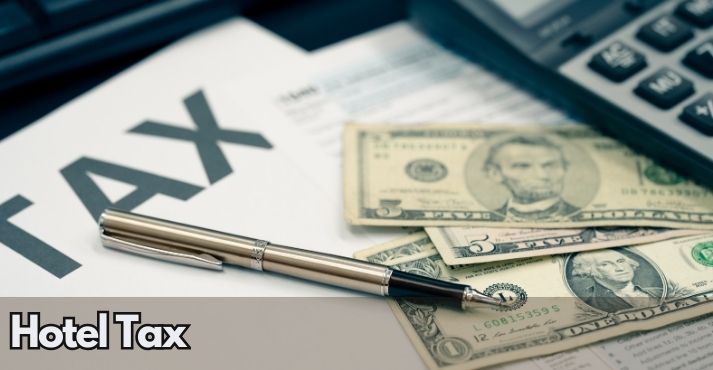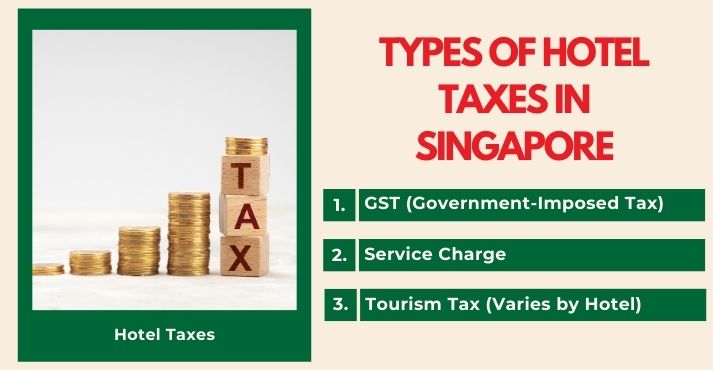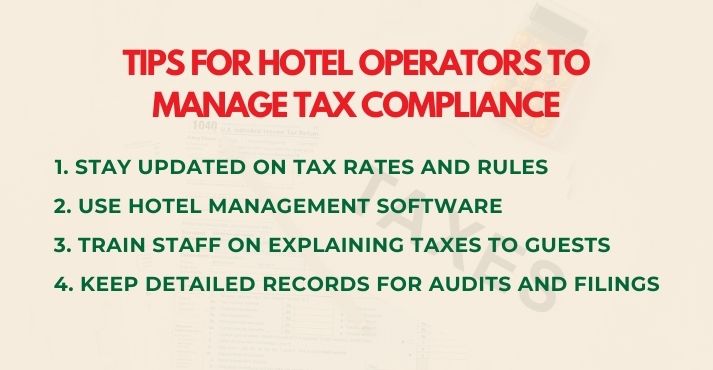Hotel tax is a mandatory fee added to guest bills in many countries. Governments impose it to support local infrastructure, tourism promotion, and city development.
Whether it’s a fixed nightly charge or a percentage of the room rate, hotel taxes help fund essential services such as public transportation, cultural attractions, and environmental conservation efforts.
Understanding hotel taxes can prevent unexpected costs for travelers, while compliance is crucial for hoteliers to avoid penalties and maintain a smooth business operation.
Tax structures vary worldwide—some countries impose value-added tax (VAT) or goods and services tax (GST), while others apply tourism or occupancy taxes.
This guide will explain the different types of hotel taxes, key regulations in major markets, and best practices for hoteliers. We’ll also examine Singapore’s hotel tax system, explaining how it works and what businesses need to know.
What is Hotel Tax?

Hotel tax or lodging tax, bed tax, or hotel occupancy tax is a fee charged to guests staying in short-term accommodations such as hotels, motels, resorts, and vacation rentals.
This tax is usually imposed by local, state, or federal governments and is either a percentage of the room rate or a fixed per-night fee.
The primary purpose of hotel tax is to generate revenue that supports tourism development, public services, and infrastructure projects.
Many cities use these funds for marketing campaigns to attract visitors, maintain transportation networks, improve convention centers, and preserve cultural sites.
Since tourists use local resources but don’t pay income taxes to the city they visit, hotel taxes help offset the costs of services like sanitation, security, and public transit.
In hotel revenue management, tax policies influence pricing strategies and financial planning. Hotel tax structures are different globally. Some regions include it within broader value-added tax (VAT) or goods and services tax (GST) systems, while others apply separate hospitality levies.
Hoteliers must ensure compliance with these regulations to avoid penalties while maintaining transparent pricing for guests, which helps build trust and financial stability.
Common Types of Hotel Taxes Around the World
Hotel taxes vary widely across countries, with different levies imposed at state, city, or national levels.
While the structure and purpose of these taxes differ, they all serve to generate revenue for tourism development, infrastructure, and public services, impacting the hotel industry significantly.
In the United States, many states impose state lodging taxes, which are added to the room rate. These may include additional local occupancy taxes based on regional rules.
Across Europe, many cities and tourist destinations apply city or tourism levies. For example, cities like Paris and Rome charge a per-night fee based on hotel classification, while others, like Amsterdam, impose a percentage-based tourist tax.
In many Asian countries, guests may encounter service charges, typically 10% of the room rate. While not technically a tax, these charges are customary and function similarly by adding to the overall cost.
Countries with VAT or GST systems, such as the United Kingdom, Australia, and Singapore, apply these consumption taxes to accommodation and hospitality services.
VAT and GST rates are set individually, with some countries offering reduced rates for tourism-related businesses.
The specific types and rates of hotel taxes can differ significantly depending on the destination. Travelers should check tax policies before booking, while hoteliers must stay compliant with local regulations to avoid penalties and ensure transparency for their guests.
How Hotel Tax Affects Guests and Hotel Operators
For guests, hotel room tax directly impacts the final bill, often adding a significant cost to their stay. Many travelers are unaware of these fees until checkout, leading to unexpected expenses.
The total amount depends on location, with some cities imposing higher rates to capitalize on tourism demand.
High hotel taxes can also influence booking decisions, encouraging travelers to choose destinations with lower rates or opt for alternative accommodations like vacation rentals.
For hotel operators, managing hotel taxes involves more than adding a charge to the bill. They are responsible for accurately collecting, reporting, and remitting taxes to the appropriate authorities.
Compliance is crucial to avoid fines; failure to adhere to tax regulations can result in legal consequences.
Many hotels rely on property management systems (PMS) and invoicing software to automate tax calculations, ensuring transparency and efficiency in financial reporting.
This is especially important for eco hotels, as some jurisdictions offer tax incentives for properties that adopt sustainable practices, such as energy efficiency, waste reduction, and water conservation.
Keeping up with changing tax laws is essential for smooth operations and maintaining trust with guests.
How Hotel Tax Is Calculated
Hotel tax is generally calculated as a percentage of the room rate or a fixed nightly fee, with some locations applying both.
For example, a hotel stay in one city might include a 10% hotel room tax, while another destination could charge a $2 per night tourism levy on top of the percentage-based tax.
Some governments also implement tiered tax rates, where luxury hotels pay more than budget accommodations.
Beyond just the room itself, what does hotel tax cover? These taxes help fund public services, tourism promotion, and infrastructure projects.
Many cities use the revenue to maintain local attractions, improve transportation, and enhance public facilities that benefit visitors and residents. In some cases, funds go toward environmental conservation or cultural preservation efforts.
Some hotels, including boutique hotels, incorporate taxes into the advertised price for transparency, while others add them at checkout.
Guests should always check whether taxes are included in the final cost, and hotel operators must ensure clear pricing to maintain trust and compliance.
Hotel Taxes in Singapore

In Singapore, hotel stays are subject to several charges, including the Goods and Services Tax (GST), a service charge, and, in some cases, a tourism tax.
- GST (Government-Imposed Tax): As of 2025, Singapore’s GST rate is 9% and applies to hotel stays, dining, and other taxable hotel services.
- Service Charge (Customary, Not Government-Imposed): Most hotels levy a 10% service charge on top of the room rate. This is a standard industry practice rather than a government-mandated tax.
- Tourism Tax (Varies by Hotel): While Singapore does not have a standardized tourism tax like some other countries, certain hotels may include additional fees related to tourism development or sustainability initiatives. These charges function similarly to tourist tax at hotels, adding to a stay’s overall cost.
GST (Goods and Services Tax) in Singapore Hotels
Singapore’s Goods and Services Tax (GST) is currently 9%. This tax applies to hotel room rates, food and beverages, spa treatments, and other services provided by the hotel.
For example, when booking a hotel room, the price listed will generally be exclusive of GST, and this tax will be added to the quoted rate at checkout. Additionally, services such as meals at hotel restaurants, event space bookings, and spa services will also be included in this tax.
GST Registration for Hotels in Singapore
Hotels with an annual turnover exceeding SGD 1 million must register for GST with the Inland Revenue Authority of Singapore (IRAS). Once registered, these hotels must file GST returns regularly (quarterly or annually) based on their business structure.
Steps for GST Registration in Singapore
Here are the steps for GST registration in Singapore:
- Eligibility Check: Businesses with an annual turnover exceeding SGD 1 million are required to register for GST. Businesses below this threshold can voluntarily register if desired.
- Set Up a myTax Portal Account: To begin, create an account on the IRAS myTax Portal. This is where you’ll manage your tax matters.
- Prepare Required Documents: Ensure you have your financial records, turnover projections, and contracts or agreements to support your GST registration application.
- Submit Your Application: You can submit your GST registration application directly through the myTax Portal.
- Confirmation and Compliance: After approval, you will receive an official letter from IRAS confirming your registration. From this point onward, you’ll be required to charge and account for GST, file GST returns, and maintain records.
GST on Other Hotel Services (F&B, Spa, Events)
GST applies not only to hotel room stays but also to services such as food and beverage offerings, spa treatments, and the rental of event spaces. For example, guests dining at a hotel restaurant or booking a spa package will find GST added to their total bill.
Tax Treatment for Complimentary or Discounted Hotel Rooms
Even if a hotel offers complimentary or discounted rooms, GST may still apply. According to IRAS guidelines, GST must be charged based on the room’s cost price or market value if a hotel provides complimentary rooms (e.g., for VIPs or promotional giveaways).
GST Absorption: Can Hotels Include GST in Displayed Prices?
Under IRAS regulations, hotels may display their room rates as GST-inclusive. However, they must clearly indicate that the price includes GST and not be misleading.
If GST is not included in the displayed price, it must be clearly stated as an additional charge when the guest checks out.
Tax Invoice Requirements for Hotels in Singapore
Hotels are required to provide a tax invoice that includes specific details. This includes:
- The GST registration number of the hotel.
- A breakdown of the items billed, including the room rate and applicable taxes.
- The GST rate applied (in this case, 9%).
- The guest’s name, if necessary, for the transaction.
Understanding Singapore’s Tourism Tax (Tourism Levy)
Singapore does not impose a standardized Tourism Tax or Tourism Levy across all hotel stays. However, hotels may include additional charges related to tourism development, sustainability initiatives, or service fees as part of their pricing structure.
- Exemptions: Since no official government-mandated Tourism Levy exists, exemptions do not apply. However, service charges and GST are standard fees in most hotels, with GST applying to all guests unless exempted explicitly under IRAS regulations.
- Display on Invoice: Any hotel-imposed fees related to tourism or sustainability must be displayed on the hotel invoice, ensuring transparency in pricing. Guests should check with individual hotels for details on additional charges beyond GST and service fees.
How the Tourism Tax Impacts Hotels
For hotel operators in Singapore, additional tourism-related fees can influence pricing strategies and guest communication.
Hotels must ensure that additional fees are communicated, especially for long-term stays or group bookings, where costs may accumulate significantly.
To maintain pricing transparency, all charges should be itemized on guest invoices to prevent confusion during checkout.
Hotels should also stay updated on policy changes from the Singapore Tourism Board (STB) or the Inland Revenue Authority of Singapore (IRAS) to ensure compliance.
Service Charge in Singapore Hotels
In Singapore, most hotels apply a 10% service charge on top of the room rate. However, it is important to note that this service charge is not a tax but a customary fee applied by hotels as part of their service model.
The service charge is typically calculated before GST is applied. This means that the GST is charged on both the room rate and the service charge, making it an additional cost for guests.
Unlike taxes, which the government imposes, the hotel retains the service charge as part of its operations. It serves as a way to compensate hotel staff for their service.
While not mandatory by law, this service charge is commonly applied across most hotels in Singapore, especially in the higher-end establishments.
Guests should know that while the service charge may be included in the final price displayed, it is still separate from the government-imposed GST and the tourism tax.
Travelers should check the terms and conditions when booking to understand how these charges are structured and whether they are included in the overall price or added separately at check-out.
Filing Requirements and Deadlines for Hotel Tax in Singapore
In Singapore, hotels are required to file GST returns according to specific timelines. Here’s an overview of the filing and reporting requirements:
GST Filing Requirements
Hotels registered for GST must file regular returns with the Inland Revenue Authority of Singapore (IRAS). The filing periods and deadlines depend on the hotel’s turnover and registration details:
- Quarterly Filing: GST returns are filed quarterly for businesses with annual taxable turnover under SGD 5 million. The due date is typically one month after the end of the quarter.
- Monthly Filing: Businesses with turnover exceeding SGD 5 million must file monthly. The filing deadline is the last day of the month following the reporting period.
Penalties for Late Submission
Late submissions of GST or failure to comply with tax reporting obligations can result in penalties, including:
- Late Filing Penalties: IRAS imposes fines if GST returns are submitted past the deadline. These fines can increase if the delay is prolonged or the hotel has a history of late filings.
- Late Payment Penalties: In addition to filing penalties, failure to pay the tax owed by the due date could result in further charges, including interest on the unpaid amount.
Penalties for Hotel Tax Non-Compliance in Singapore
Non-compliance with hotel tax regulations in Singapore can lead to significant financial penalties and other consequences for hotel operators.
While there is no specific tourism tax in Singapore, businesses must adhere to GST filing and payment deadlines. Failure to comply with GST regulations can result in costly repercussions.
Fines and Penalties
- Late Filing Penalties for GST: Hotels that fail to submit their GST returns by the deadline may incur late filing penalties. The penalty can increase depending on the length of the delay, with fines potentially reaching up to SGD 200 for the first instance and higher amounts for continued non-compliance. More severe penalties may apply if the hotel has a history of late submissions.
- Late Payment Penalties for GST: If GST payments are not made by the due date, the IRAS charges a 5% penalty on the outstanding amount. Interest is typically calculated at 5% per annum, compounded monthly. Continued late payments can lead to escalating penalties, increasing the cost of non-compliance.
Audits and Investigations
IRAS may conduct a tax audit in cases of significant discrepancies or persistent non-compliance. These audits are thorough and can disrupt hotel operations, leading to significant administrative costs and reputational damage.
In addition to the audit, the hotel could face further investigation and even criminal prosecution under Singapore’s tax laws if any tax evasion is suspected.
Cost of Non-Compliance
The overall cost of non-compliance extends beyond just the financial penalties. Hotels may face:
- Reputational Damage: Tax-related issues can negatively affect a hotel’s reputation with guests and other business partners.
- Operational Disruptions: Audits and investigations can divert staff time and resources from regular business activities.
- Increased Scrutiny: Once a hotel is found non-compliant, it may be subject to more frequent audits, making future non-compliance even more costly.
Preventive Measures
To avoid these penalties, hotels should invest in proper tax management systems and ensure they are regularly updated on the latest tax laws and filing requirements.
Partnering with accountants or tax experts can help ensure that all taxes are handled efficiently and by the law.
By staying compliant, hotels can avoid the financial burden and operational disruption that comes with penalties, ensuring smoother operations and a positive reputation.
Tips for Hotel Operators to Manage Tax Compliance

Managing hotel tax compliance is crucial for avoiding penalties and ensuring smooth operations. Here are some best practices to help hotel operators stay on top of their tax obligations:
- Stay updated on tax rates and rules: Tax rates and rules, including GST and other local taxes, can change frequently. Hotel operators should regularly monitor updates from tax authorities like IRAS in Singapore to avoid miscalculations. Understanding how hotel tax works is important for staying compliant.
- Use hotel management software for tax calculation: Using reliable software can automate calculating and displaying invoice taxes. This ensures that guests and operators clearly understand the hotel tax explanation without hidden costs. Modern software can calculate hotel occupancy tax and apply service charges or other levies accurately, reducing the chance of errors.
- Train staff on explaining taxes to guests: Tax confusion can lead to guest dissatisfaction. Hotel operators should train staff to clearly explain applicable taxes, including tourism levies or service charges, as part of the booking process or at check-in.
- Keep detailed records for audits and filings: Hotels must maintain accurate records of all tax filings and payments for future audits or reviews. Comprehensive documentation ensures the hotel can quickly comply with tax reporting requirements and defend against potential audits or investigations. A clear audit trail is also essential for GST registration and filing returns accurately.
Conclusion
Hotel tax is a significant part of the hospitality industry’s operational framework, impacting guests and operators. Whether it’s the hotel room tax or service charges, understanding how hotel tax works is essential for compliance and customer satisfaction.
With GST and service charges, Singapore’s multi-layered tax system is an excellent case study for hotel operators worldwide.
By staying informed, using the right systems, and ensuring clear communication, operators can ensure smooth operations while remaining compliant with local tax regulations.
Being proactive and transparent in handling taxes helps avoid penalties and builds trust with guests, making the overall experience more seamless and enjoyable.













